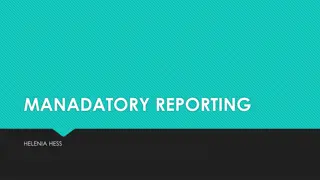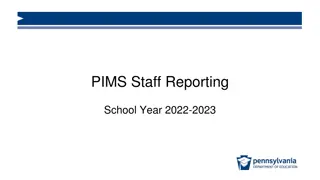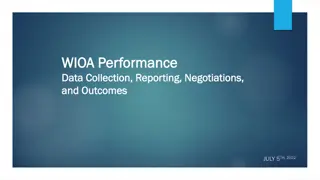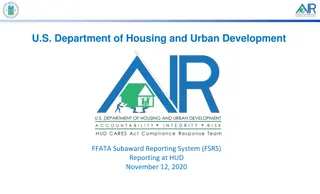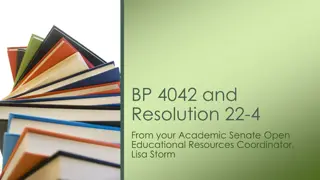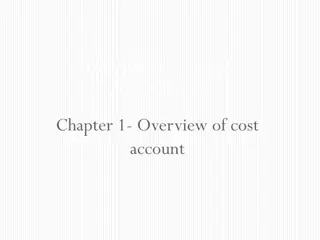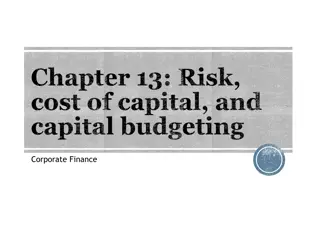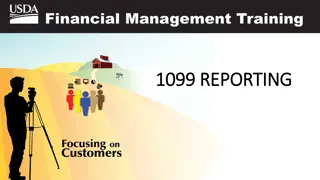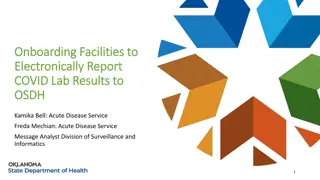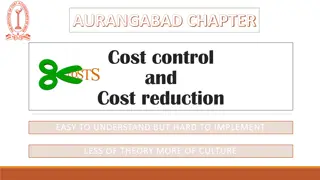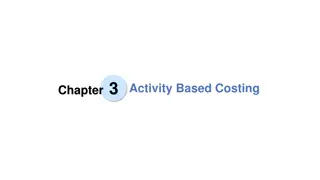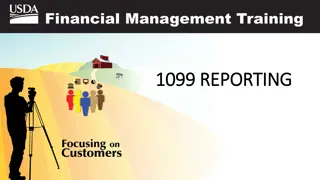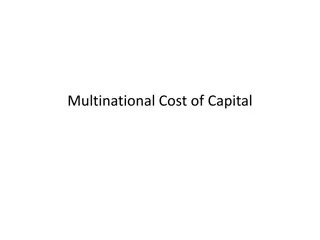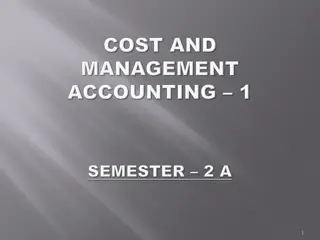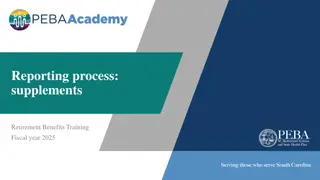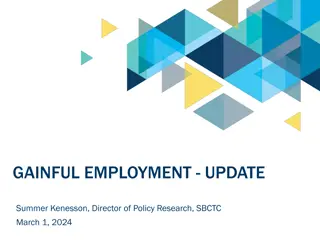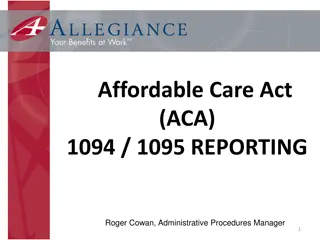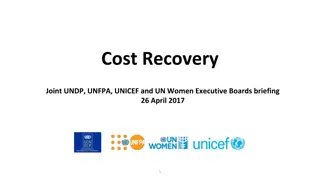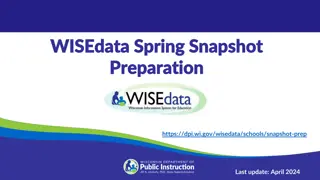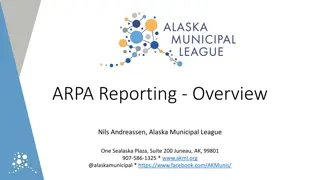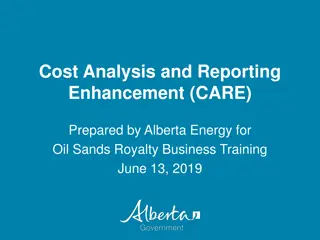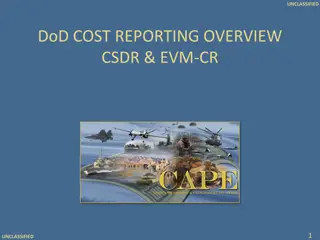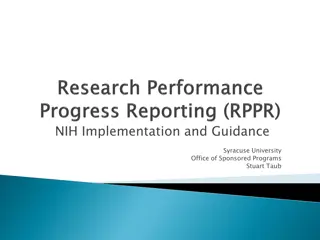ECC Social Value Reporting and Evaluation Framework
Essex County Council (ECC) has implemented a robust Social Value Reporting and Evaluation framework based on the Local Government Association's National TOMs method. This framework categorizes and assesses social value contributions in two parts - Value Score and Supporting Statement Score - to deri
3 views • 16 slides
Importance of Integrating Sustainability Reporting in Government Accounting
Sustainability reporting in government accounting in Africa promotes transparency, supports Sustainable Development Goals, attracts investments, manages resources, enhances efficiency, and fosters partnerships. The role of government accounting is crucial for transparent and sustainable governance t
3 views • 9 slides
Overview of Fall 2019 Reporting Information Session
High-level overview of TRS reporting for Fall 2019 including legislative changes, summary of rate changes for fiscal years, tips on starting a new year, and additional reporting tips. The presentation emphasizes the importance of accurate reporting and compliance with TRS Laws and Rules. Ensure time
1 views • 29 slides
Mandatory Reporting Guidelines for Suspected Child Abuse/Neglect
Understanding mandatory reporting requirements for child abuse and neglect is crucial for various professionals and individuals working with children. This content emphasizes the legal obligations and procedures involved in reporting suspected cases, ensuring immunity for those reporting in good fai
1 views • 6 slides
Comprehensive Overview of PIMS Staff Reporting for School Year 2022-2023
Offering insights into PIMS Staff Reporting agenda, reasons for data reporting, roles of EL Coordinators, and details on Professional Staff reporting criteria and templates. The content covers federal reporting requirements, Equitable Access data, and trends in education personnel.
1 views • 39 slides
Comprehensive Cost Management Training Objectives
This detailed training agenda outlines a comprehensive program focusing on cost management, including an overview of cost management importance, cost object definition, cost assignment, analysis, and reporting. It covers topics such as understanding cost models, cost allocations, various types of an
2 views • 41 slides
WIOA Performance Data Collection and Reporting Overview
Requirements for reporting under the WIOA program, including data collection, negotiations, and outcomes reporting. Details on the reporting periods, reporting entities, core programs, partners, and the individuals included in the Participant Individual Record Layout (PIRL) reports.
6 views • 25 slides
Understanding FFATA Subaward Reporting System (FSRS) at HUD
FFATA requires federal award information to be publicly available on a searchable website. FSRS is a reporting tool for prime awardees to report sub-recipient/contractor awards and executive compensation data. This article delves into FFATA requirements, FSRS roles, responsibilities, and reporting p
2 views • 15 slides
Academic Senate Resolutions and Low-Cost Thresholds in Higher Education
The Academic Senate addresses the adoption of open educational resources (OER) and low-cost materials to support academic freedom and compliance with legislative requirements. The resolution discusses the definition of low-cost resources and the variability among California Community Colleges in set
2 views • 9 slides
Understanding Cost Accounting Essentials
This overview delves into topics such as financial accounting, classification of accounts, cost ascertainment, and management accounting. It covers the meaning of cost, methods and techniques of costing, advantages and limitations of cost accounting systems, and essentials for a robust cost accounti
4 views • 27 slides
Understanding Risk, Cost of Capital, and Capital Budgeting in Corporate Finance
Explore the concepts of risk, cost of capital, and capital budgeting in corporate finance, including the Capital Asset Pricing Model (CAPM), cost of equity, beta estimation, and cost of capital. Learn how to reduce the cost of capital and understand the impact of reducing the Weighted Average Cost o
0 views • 20 slides
Understanding 1099 Reporting Guidelines and Systems
The article provides insights into the 1099 reporting process, including details about the Miscellaneous Income System (MINC), Form 1099 issuance, criteria for 1099 reporting, the Statement of Earnings System (EARN), and the Special Payroll Processing system (SPPS). It explains the responsibilities
2 views • 15 slides
Streamlining Electronic Reporting of COVID Lab Results to OSDH
This documentation outlines the process of electronically reporting COVID lab results to the Oklahoma State Department of Health (OSDH). It covers the purpose, available options, specifications, formats, and the onboarding and testing process, aiming to accelerate the reporting of healthcare facilit
0 views • 9 slides
Cost Control and Cost Reduction Strategies in Business: Understanding Implementation Challenges
Understanding the concepts of cost control and cost reduction is crucial for businesses, but implementing them can be challenging. This chapter explores the influencing factors for success in cost control and reduction, emphasizing the importance of cultural aspects, leadership, and management appro
1 views • 15 slides
Understanding Activity-Based Costing (ABC) in Cost Management
Activity-Based Costing (ABC) is a strategic costing method that allocates overhead costs to products based on activities. It offers benefits such as accurate cost allocation and identifying cost drivers but also has challenges due to increased complexity and customization. ABC differs from tradition
1 views • 15 slides
Overview of 1099 Reporting Systems
The 1099 Reporting Systems consist of MINC, EARN, and SPPS, which are used for IRS 1099 reporting purposes. These systems handle transactions and generate Form 1099 for recipients based on predefined criteria. Taxpayers are responsible for accurate reporting to the IRS, with reporting thresholds set
0 views • 15 slides
Understanding the Cost of Capital in Finance
The cost of capital is crucial for businesses to determine the average cost of their finance. The Weighted Average Cost of Capital (WACC) is used as a discount rate in financial calculations. It involves estimating the cost of each source of finance and calculating a weighted average. Additionally,
0 views • 14 slides
Understanding Multinational Cost of Capital
Multinational corporations determine their cost of capital based on the cost of debt and equity. The cost of debt includes the interest rate and credit risk premium, while the cost of equity reflects the risk premium investors demand. Estimating an MNC's cost of capital involves assessing these comp
0 views • 24 slides
Understanding Cost Accounting: Techniques and Processes
Cost accounting is a specialized branch of accounting that involves the accumulation, assignment, and control of costs. It encompasses techniques like ascertainment of costs, estimation of costs, and cost control to aid in decision-making. Cost accounting plays a crucial role in budgeting, standard
2 views • 11 slides
Hemp Acreage Reporting & Certification Q&A with USDA
Explore essential information about Hemp Acreage Reporting, Certification, and compliance procedures in this Q&A session with the Farm Service Agency (USDA). Learn about important deadlines, required documentation, and the significance of reporting accuracy for various programs. Discover how to file
0 views • 15 slides
UNEP Support for Improving UNCCD Reporting Procedures
UNEP has been providing support since 2010 to enhance the reporting processes of the UNCCD, focusing on streamlined funding approaches, technical assistance, and capacity building. Key outcomes include the development of reporting tools, online reporting systems, and building credible data from coun
0 views • 14 slides
Climate Change Monitoring, Reporting, and Verification (MRV) Training Session Overview
This document outlines the purpose and reporting requirements for the development of a Climate Change Monitoring, Reporting, and Verification (MRV) system, focusing on projections and scenarios. It highlights the importance of collecting information for climate mitigation, assisting Serbia in meetin
0 views • 19 slides
Transitioning to Incident-Based Crime Reporting: Enhancing Transparency and Accountability
Anytown Police Department (APD) is leading the transition from Summary Reporting to Incident-Based Reporting through the National Incident-Based Reporting System (NIBRS). This change promotes transparency, provides detailed crime data to the public, and improves statewide and national crime statisti
3 views • 17 slides
Insights into Structured Reporting Practices in Colorectal Cancer Imaging
A survey conducted by Dr. Eric Loveday at North Bristol NHS Trust revealed the current landscape of structured reporting in MRI and CT scans for rectal and colon cancer. Results indicate a positive outlook towards implementing national standards for structured radiology reporting, with an emphasis o
0 views • 7 slides
Introduction to Industrial Costing: Understanding Cost Types and Accounting Systems
Explore the fundamentals of industrial costing, including different cost types and accounting systems such as actual cost accounting, normal cost accounting, and standard cost accounting. Learn about cost data control, tasks of cost accounting, and the integration of cost type accounting in cost and
1 views • 24 slides
Employee Benefits Reporting and Training Procedures for Fiscal Year 2025
The reporting process for retirement benefits in fiscal year 2025 includes supplements, employer reporting representatives, supplemental contribution reporting, service reports, furlough supplements, and a disclaimer. Employers can find detailed instructions on submitting various forms through the E
0 views • 6 slides
Streamlining Gainful Employment Reporting Process for Title IV Programs
Gainful Employment reporting requirements for Title IV programs involve historical uploads, student data submissions, and a detailed workplan by SBCTC to assist colleges in meeting compliance. The reporting burden includes annual updates and student-level data reporting. SBCTC's workplan aims to red
0 views • 16 slides
Affordable Care Act (ACA) 1094/1095 Reporting Guidelines
Affordable Care Act (ACA) requires employers to report information to the IRS regarding individual and employer responsibilities under the ACA. The reporting includes details on individual responsibility, employer responsibility, exemptions, and reporting requirements for different types of employer
0 views • 52 slides
Managing Summer Cost Share for Faculty with 9-Month Appointments
Explore the process of setting up and monitoring summer cost share for faculty with 9-month appointments. Learn why cost share for summer may not display on the FEC, how GCA establishes cost share using the Cost Share Module, and how departments should adjust the FEC to reflect summer cost share acc
0 views • 15 slides
Simpler Systems Reporting Pilot for Financial Data Enhancement
The Simpler Systems Reporting Pilot is underway to enhance financial data reporting at the university campus. Led by Vice President Ryan Nesbit's team, this initiative aims to improve University-wide financial reporting mechanisms and accessibility to data through the Simpler tool. The pilot include
0 views • 5 slides
Joint UNDP, UNFPA, UNICEF, UN Women Executive Boards Cost Recovery Briefing
Briefing on cost recovery for the joint Executive Boards of UNDP, UNFPA, UNICEF, and UN Women, covering topics such as feedback on cost recovery, role of core resources, cost recovery models using a LEGO approach, harmonization efforts, guidance for Executive Boards, and next steps towards proposing
0 views • 42 slides
Overview of WISEdata Snapshot Preparation and Reporting Requirements
The WISEdata Snapshot Preparation provides crucial details on data entry, validation, and reporting processes for educational institutions. It outlines the importance of accurate data collection for federal reporting, public reporting, and funding determinations. Additionally, the Snapshot Reporting
0 views • 41 slides
Ensuring Chemical Reporting and Preparedness at the DEQ
The Chemical Reporting and Preparedness section at the DEQ focuses on regulations under EPCRA, prompted by incidents like the Bhopal tragedy. EPCRA covers Tier II reporting, spill reporting, LEPCs, State Emergency Response Commission, and Oklahoma Hazardous Materials Emergency Response Commission. T
0 views • 17 slides
ARPA Reporting Overview and SLFRF Guidelines in Alaska
This document outlines the reporting overview for the ARPA (American Rescue Plan Act) and specific guidelines for the Coronavirus State and Local Fiscal Recovery Fund (SLFRF) in Alaska. It covers acceptance, use, and reporting of funds, as well as designating staff roles for managing reports. The co
2 views • 22 slides
Cost Analysis and Reporting Enhancement (CARE) for Oil Sands Royalty Business
Enhance your oil sands royalty business with the Cost Analysis and Reporting Enhancement (CARE) program by Alberta Energy. CARE assists in assessing the effectiveness of the Royalty Regime, supports policy development, strategic planning, and forecasting processes. It provides project assessment, tr
0 views • 45 slides
Feedback Analysis on Medication Incident Reporting in Hospitals
Feedback received from IMSN members on NIMS and incident reporting revealed various issues affecting the rates at which staff report medication incidents/near misses within hospitals. Major themes included staffing numbers and turnover, pharmacist involvement in incident reporting, clinical pharmacy
0 views • 12 slides
Importance of Wildland Fire Reporting to the Fire Community
Wildland fire reporting plays a critical role in providing accurate data for effective fire management. Defined state fires and challenges in reporting impact funding, risk management, and agency support. Comprehensive reporting like the Wildland Fire Occurrence Reporting for Massachusetts is essent
0 views • 6 slides
Defense Cost Reporting and Systems Overview
Defense Cost Analysis and Reporting Systems (CSDR) provide the cost community with essential data for developing independent cost estimates within major defense acquisition programs. The Defense Automated Cost Information Management System (DACIMS) offers instant access to historical cost informatio
0 views • 19 slides
Importance of Cost Accounting in Business Management
Cost accounting plays a crucial role in modern business environments where cost effectiveness and quality consciousness are vital for success. This branch of accounting helps in planning, controlling, and determining the costs of products or services, providing essential data for efficient managemen
0 views • 6 slides
Streamlining Research Progress Reporting for NIH Awards
Research Performance Progress Report (RPPR) is a standardized mechanism to facilitate interim progress reporting for NIH-funded projects, aiming to enhance consistency and minimize administrative burdens. It replaces the eSNAP process for certain types of awards and fellowship grants. RPPR includes
0 views • 12 slides



